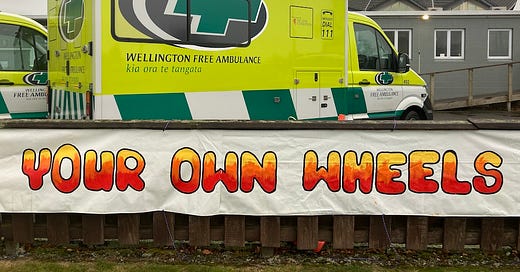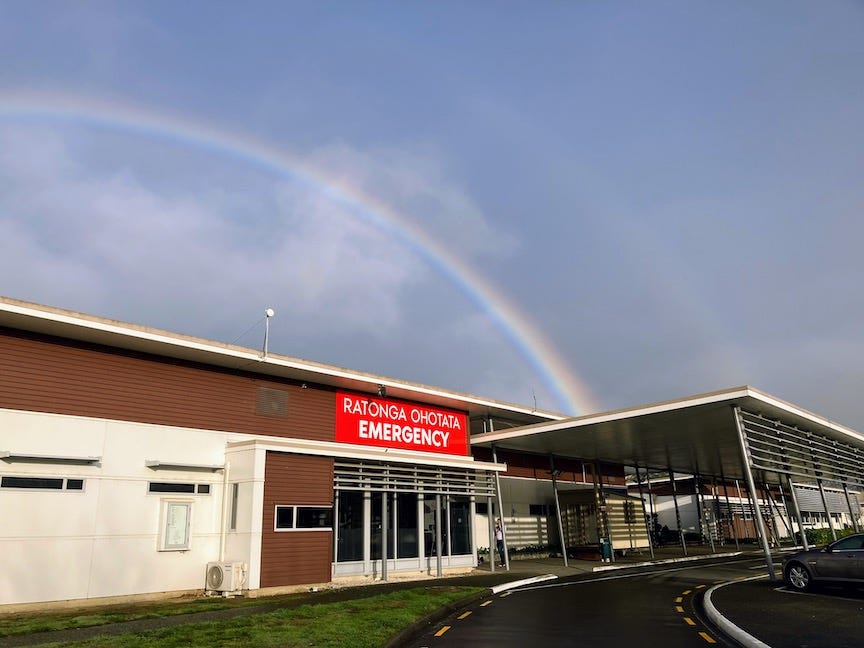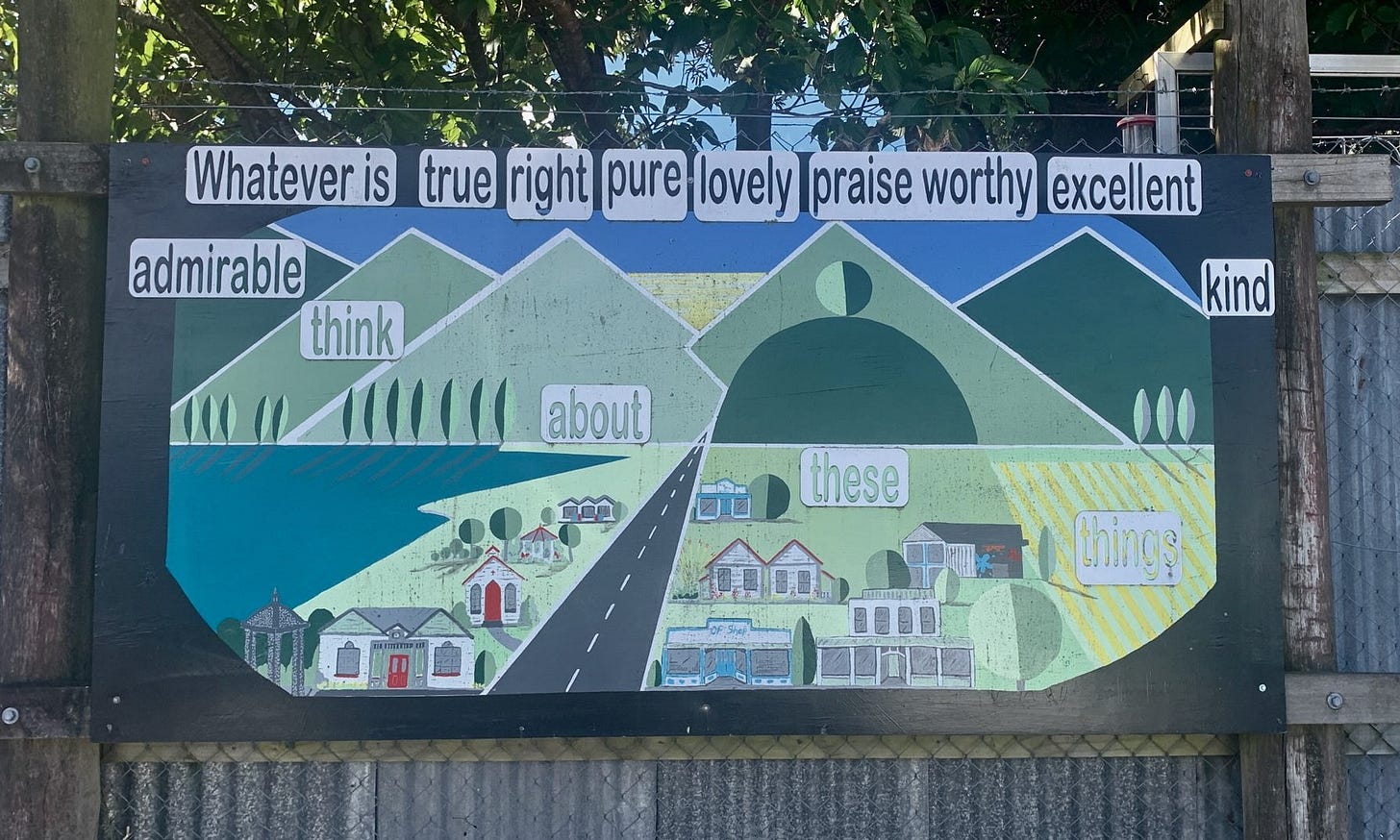Should You Be a Doctor in New Zealand?
The straight dope from Americans in Aotearoa's public healthcare
Kia ora! This week we’ve got the inside dish on a crucial part of NZ life, a medical companion to my recent post Should You Move to New Zealand? I’d love to hear about your own experience! Comment below, or drop by the new subscriber chat.
New workshop! How to Write a Newsletter will be May 22 from 6:00-7:30 p.m. at the Greytown Distilling Company Tasting Room in Greytown, NZ. Come join us!
Got a writing question? Considering the move south? An Ask Me Anything subscription includes a free consulation. These weekly letters are always free.
For a couple years now, the ambulance depot in Masterton has had a huge, handpainted American song lyric hung on its front fence: DON’T LET THE SOUND OF YOUR OWN WHEELS DRIVE YOU CRAZY. The Eagles, man. Here’s the Kiwi kicker: the ambulances behind the sign are free. We had a ride once. No questions, no bills. Anyone sick in greater Welly: the wheels are ours.
Public healthcare sparks both deep longing and existential terror in the American soul. What, they just take care of you? Whaddya mean my money’s no good?? New Zealand has both public and private systems, one mostly free and one fairly spendy if you don’t have insurance. There’s also ACC, a national accident insurance for most any injury anywhere in New Zealand. It also covers malpractice, so there’s no lawsuits. Imagine!
Some of us have done more than imagine. This month I interviewed three U.S. health care professionals about their experience working in New Zealand’s public system. I granted them anonymity in order to speak freely, and they generously shared their stories with me. Over the course of the interviews, NZ’s conservative government issued a gag order against public health staff doing any sort of public advocacy—but we didn’t discuss fast food, so we should be in the clear.
We’ll call these professionals Ben, Jess, and Sam. I won’t name ranks and specialties, but they’ve worked on both islands, in cities large and small. They’ve all worked in the public system; a couple have done a bit of private work as well. Two are still here, and one’s recently moved home. The quotes have been lightly edited and condensed for clarity and anonymity. That’s me with context in italics.
The switch was easy.
Ben hired an agency to handle his move.
BEN: New Zealand made it very easy. We found a private recruiter who held our hand, and I think that that overcame the inertia. They found us the jobs, and then they got us the licenses and they got us the immigration attorney.
Jess and Sam were already in the country and decided to stay.
JESS: On a whim, we went to talk to the admin at [a medical school in New Zealand] to see what the process would be like. And they literally were like, oh, you’re interested in studying? Come, I’ll let you sit down with the head lecturer of the department. And within five minutes, we were in her office and chatting.
SAM: I was traveling, doing the backpacking thing, and then COVID hits. As things unfolded politically and medically around the world, I felt like, ‘I’ve lucked out being here. Maybe I should try to stay.’ And the way to do that was clearly just to practice, because that was a thing I could get a job and a visa with.
The values here are different.
JESS: The way they do health care here, it does feel more holistic. You’re actually spending time with them, looking at that whole person, understanding their family, connecting with their family, understanding how they live at home. But I’ve definitely seen in the past probably six or seven years that there is a lot more focus now on documentation and statistics. You don’t have as much time with people because of the enormous amount of paperwork that has taken over. Which is unfortunate, because they still preach the values.
SAM: Having worked in the U.S. healthcare system and then leaving it, I could not go back to it. The expectation [in the U.S.] is that you see client after client, with no break, and that's just not doable—I mean, unless you’re a really shitty practitioner and you’re not doing your job well and giving of yourself.
BEN: It’s a tricky thing between what’s right for a population and what’s right for an individual. I think New Zealand makes decisions wisely based on a population, and is not as concerned about an individual. Which I agree with. But it’s different when it’s your family. For my family—unfairly—I want the extras. You know, I think private schools are terrible for a society. But I’m sending my kid to one.
The pay is less—but enough.
SAM: The wages are unequivocally considerably lower. The work-life balance and quality of life is higher.
JESS: There was a period of time when you could literally make double if you went to Australia. When we got that huge pay increase [in 2023] that made a big difference. But this year they’ve approved 1% [for a cost of living adjustment.] In comparison to inflation, it’s nothing. And so I imagine we’re going to have another big shift over the next two years where people will leave.
BEN: You know, it’s not as much money. But I actually felt like I thought about money a lot less there than in the US.
The work-life balance is better.
SAM: My work, it’s three days a week.
Wait—you work three days a week?
SAM: I live with people, so my rent isn’t super expensive. I don’t lead a very lavish lifestyle. And I’m on the very top of the pay scale because of how many years I’ve been practicing. The pay isn’t like software-developer pay or upper-manager pay, but it’s doable for my lifestyle.
BEN: They asked me to see three patients a day and they call that a full day’s work. And I just—especially having tasted the goodness of New Zealand—I can’t go back to 16 patients a day. I was talking to [an American] practice that wanted 24 a day! But I do think New Zealand maybe needs more Americans to crack the whip. Maybe there’s a happy middle ground. I think it’s so preposterous and sad that that’s what’s expected for a doctor in my field to be seen, given how bad the need is. But it’s also wonderful for the doctors.
Maybe the patients are, too.
BEN: I do find that Kiwis are much better patients. They’re much more trusting. They’re less demanding. They’re more inclined to trust their doctor. They are somewhat stoic, so when they come in it’s usually because there’s a real need. There’s also just a much more collective mindset, right? I had a patient the other day, and I kind of said, Hey, can I kick you out of the service? [Because the patient had made so much progress.] And I feel like an American would say, ‘Get fucked, I want the care that I’m entitled to.’ And he said, ‘Well, you guys are stressed, if it would be good for the service, that’s fine.’
Sometimes less is more.
The “stress” Ben describes is the limits of a public system: you take your turn, and there are only so many spots. But America’s private system has its own stress.
SAM: There was incentive [in the U.S.] to keep seeing a patient, because a patient that comes back every week regularly for a long time is continued money. Whereas probably the most ethical and empowering way to practice would be more of a consultative model, and less of a handholding model. But then that’s less money because then you have to go get new clients. It’s easier to keep the same client week after week. Here it’s a lot more consultative. At the outset I get to say, ‘This is a brief episodic involvement, and I’m going to give you ideas and strategies and suggestions and send you on your way.’ So there’s that level of distance that is healthy for a practitioner, I think.
Sometimes less is just less.
SAM: I think there has to be a balance struck. There are a lot of families that are in a resourced place to be able to carry out what you advise, and it works great. But then there are those families in survival mode where they actually need somebody to do it for them, otherwise it won’t get done. And those families don’t get served, basically, unless they get lucky somehow with like some resourced entity that can walk them through it. But that’s probably not gonna be the public system.
There’s opportunity for professional growth.
BEN: I would argue that professionally, I was bound to be happier in New Zealand. Within the public system, it wouldn’t have taken much to become the head of the department. I also think a private practice would do really, really well.
SAM: I’ve been doing some private work here as well. I’ve been doing some trainings in the community. I recently was shoulder-tapped by my manager to attend this training on a new diagnostic assessment tool. It’s not really within the realm of my position, but I’ve done extensive work in that space, and my service only had one person who’s qualified to do those assessments and the doctors have a huge backlog. And it’s actually cool to be the one doing this assessment, because then I get to be the one that frames the whole diagnostic experience to patients in a positive, affirming light, which is a nice place to be professionally.
The infrastructure can be rough.
Basic infrastructure problems have made headlines here for years.
JESS: It’s dreadful. Our particular area of the building had such issues with mold, because of course it’s quite damp there, and staff were sick all the time. They were trying to do these claims for health and safety, like we’re trying to do our jobs but we can't come to work because we’re so sick from the mold, and it goes nowhere. They won’t acknowledge it. They’re just like, ‘You’ll be fine.’
BEN: It’s really bad. One wing was closed weeks on end because of moldy walls. It’d be unbearably hot in the summer. The labor and delivery room did not have airflow and women were laboring in really hot temperatures. The raw technology, the surgical tools, the screens, the ultrasounds are good, and the doctors are competent—but you don’t get any extras. We would joke that it’s a third world hospital but it’s a nice third world hospital.
The patient waitlists are long.
Waitlists for non-urgent care have ballooned since the pandemic.
JESS: They’re getting referrals accepted, but it’s over a year’s wait. Their whole body could be impacted by waiting for a whole year to find out that they've got something wrong with them. And when you're talking about [mental health] diagnoses that could change their future, like ADHD or whatever, not having that cared for in a time-appropriate way means that now they've dropped out of school.
SAM: Just the hoops to jump through to get any kind of equipment, the wheelchairs and buggies and things that patients who have compromised muscles and brains and bodies need to just be able to sit upright and eat their meal. Even if we allocated it as a priority and put all the paperwork in, six months goes by and then you have to chase it up, and then by the time you hear back, it’s like, ‘Oh well, the quote expired.’ It’s just a total shambles.
BEN: There’s also a shadow wait list, which is we basically declined all but the very worst cases. So I don’t think the wait lists are any indication of how severe the situation really is.
The recent reorganization has been tough.
New Zealand reorganized its health system in 2022, merging the country’s 20 local District Health Boards (DHBs) into a new national ministry, Health New Zealand / Te Whatu Ora.
JESS: Te Whatu Ora are very happy not to replace vacancies. And so as soon as someone leaves a job, they're quite happy to not have that filled. You have half the amount of staff, but you are expected to carry the same caseload.
BEN: A lot of superficial silly shit, right? Like having to change your email signature. And I don’t know if they ever admit it, but there was a hiring freeze. It felt like a steady stream of departures with no arrivals.
But the values and community really do matter.
JESS: Some of my colleagues have been in their roles for like 30 years, and they’ve seen it all. And they have struggled through and tried to fight for all of it. And they keep coming back, and they love doing the role that they do. Their commitment and determination to just keep serving the people of the community is huge. That’s something that I love about the New Zealand workforce, particularly in the healthcare system. And I’m sure that that’s like that in the U.S. as well, in places. But we’re certainly not doing it for the money here. People are here because they want to be here, and they’re nursing here because they want to be nursing here.
BEN: I think in New Zealand, probably, the poor consume more healthcare than the rich. Which is how it should be. In America, I can almost guarantee you it’s the opposite.
SAM: Culturally it’s quite different, within the medical system and just with the indigenous climate and the lack of billing productivity the way it is in the U.S. You could do really well and have a really good life here. But you’ll soon realize it’s not like this rose-colored perfect panacea that people in the U.S. think it is.
JESS: I love it. It’s my home. I think that whoever chooses to come over, they won’t regret giving it a try.
Would you move back to America?
JESS: Never.
Why not?
JESS: Obviously I love so many people from America, so I’m not trying to put everybody in one box. But certainly the mindset has shifted a lot in that country, and it no longer sits alongside our value system of valuing other people as humans. It doesn’t matter where you’re from, it doesn’t matter who you are. You’re a beautiful human. We want to be with people who share that same view. Unfortunately, it feels like America has shifted more to a ‘Americans are the best’ and they’re the only real valuable humans.
SAM: I mean, I’m not moving back right now, that’s for sure. I have a decent schedule and where I live is sunny and beautiful. So, you know, that paired with what’s happening in the US is like, I’m just going to stay here for now.
Ben recently returned the U.S., but wouldn’t rule out a return.
BEN: Well, I’m the member of my relationship that wants to go back! I think New Zealand is a country whose values I believe in. I don’t know if that’s true of America anymore. //
Further reading…
Here on Substack I read and for NZ health care news.
Here’s a great FAQ page for any doctors considering the move, from an American who’s done it. Here’s the deep reddit thread that inspired the page.
Agencies for helping American doctors are easy to find, but I don’t know enough to endorse any one in particular.








Thanks Dan, this is illuminating. I was urgently referred to a hospital specialist just over a week ago, my appointment letter arrived yesterday and it’s only a month away. There will always be horror stories, but my life-long experience in the system has been largely positive. I will fight tooth and nail for public healthcare in New Zealand and your three Americans have reinforced that view.
This was so interesting to read! I wonder whether people from different countries would have different experiences than people coming from the US. Loved reading about this little behind the scenes in our healthcare system!